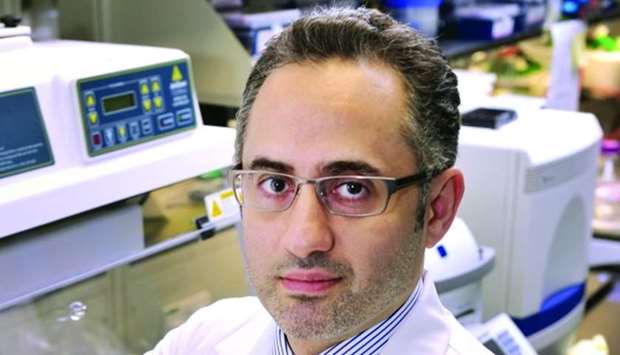Weill Cornell Medicine-Qatar (WCM-Q) has signed a research agreement with pioneering US biotechnology company Moderna, Inc. to develop a new cholesterol-controlling drug that could lead to radically improved treatments for type 2 diabetes and cardiovascular disease.
Under the agreement, Moderna, which is based in Cambridge, Massachusetts, will sponsor a study by WCM-Q researcher to develop and test a new therapy for rebalancing levels of circulating blood lipids by effectively increasing the clearance of atherogenic lipids and enhancing the production of functional, anti-inflammatory lipid species.
Individuals with a high ratio of LDL (low-density lipoprotein) to HDL (high-density lipoprotein) are at an elevated risk for developing cardiovascular disease (CVD) and far more likely to develop conditions such as metabolic syndrome, type 2 diabetes and cardiovascular disease.
A safe and efficacious new therapy capable of enhancing the body's own lipid clearance mechanisms would have the potential to further reduce the residual risk of developing these conditions and improve the health and quality of life of individuals already at elevated CVD risk.
The new experimental therapy will be based on the interactions of microRNA and messenger RNA, one of the most exciting and promising targets of drug research. MicroRNA is a type of naturally occurring molecule that influences the way genes are translated from code into the proteins that make up an organism. It does this by interacting with another type of RNA, called messenger RNA (mRNA), which contains a set of instructions for turning the code held in DNA into proteins.
In this context, WCM-Q researcher Dr Hani Najafi said: "This is an attractive approach for targeted gene therapy where we dont need to manipulate the DNA permanently. Instead, we can potentially use a small RNA (microRNA) to precisely finetune and influence mRNA expression and control the way lipid genes are regulated on a transient basis in response to lifestyle and diet. This novel approach has the potential of reducing unwanted circulating lipids and vascular inflammation in a manner and to a degree that has never been seen. This would give us a highly effective tool for treating or even helping to prevent the development of conditions like type 2 diabetes, metabolic syndrome and cardiovascular disease."
Senior Associate Dean for Research, Innovations and Commercialisation at WCM-Q Dr Khaled Machaca said: " The combination of Moderna's groundbreaking mRNA technology platform and our world-class expertise and facilities here at WCM-Q gives us a great foundation for developing novel therapies that could one day make a real difference to many people's lives."
Dr Machaca also said: "This is an important moment for the Biomedical Research Programme at WCM-Q as we look to move our discoveries from the lab to the marketplace to help Qatar's sterling efforts to diversify its economy. We are very pleased that the Industry Academia Alliances event played a key role in this collaboration."
Individuals with a high ratio of LDL (low-density lipoprotein) to HDL (high-density lipoprotein) are at an elevated risk for developing cardiovascular disease (CVD) and far more likely to develop conditions such as metabolic syndrome, type 2 diabetes and cardiovascular disease.
A safe and efficacious new therapy capable of enhancing the body's own lipid clearance mechanisms would have the potential to further reduce the residual risk of developing these conditions and improve the health and quality of life of individuals already at elevated CVD risk.
The new experimental therapy will be based on the interactions of microRNA and messenger RNA, one of the most exciting and promising targets of drug research. MicroRNA is a type of naturally occurring molecule that influences the way genes are translated from code into the proteins that make up an organism. It does this by interacting with another type of RNA, called messenger RNA (mRNA), which contains a set of instructions for turning the code held in DNA into proteins.
In this context, WCM-Q researcher Dr Hani Najafi said: "This is an attractive approach for targeted gene therapy where we dont need to manipulate the DNA permanently. Instead, we can potentially use a small RNA (microRNA) to precisely finetune and influence mRNA expression and control the way lipid genes are regulated on a transient basis in response to lifestyle and diet. This novel approach has the potential of reducing unwanted circulating lipids and vascular inflammation in a manner and to a degree that has never been seen. This would give us a highly effective tool for treating or even helping to prevent the development of conditions like type 2 diabetes, metabolic syndrome and cardiovascular disease."
Senior Associate Dean for Research, Innovations and Commercialisation at WCM-Q Dr Khaled Machaca said: " The combination of Moderna's groundbreaking mRNA technology platform and our world-class expertise and facilities here at WCM-Q gives us a great foundation for developing novel therapies that could one day make a real difference to many people's lives."
Dr Machaca also said: "This is an important moment for the Biomedical Research Programme at WCM-Q as we look to move our discoveries from the lab to the marketplace to help Qatar's sterling efforts to diversify its economy. We are very pleased that the Industry Academia Alliances event played a key role in this collaboration."

